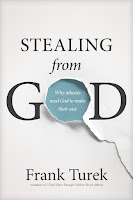The last three years of the COVID-19 pandemic has taken its toll in many ways on every person. It has not really left anyone untouched. Many have had friends and family, if not themselves, in hospitals, barely clinging to life as doctors scramble to give them relief and a chance at recovery.
Rick Carr is one who found himself a victim of the virus, spent many months in the hospital and is still recovering from its effects today. As he could, he brought the readers of his blog along through the journey of pain, prayer, gratitude, and healing. You can read about it at his site
Extreme Gratitude.
A line in his post on healing and prayer made a profound point:
"If this long, miserable process has resulted in others being helped, encouraged, strengthened in their faith, and praying like they haven’t before, then it has been worth it."- Rick Carr
Many people wonder how an all-loving God could allow them to suffer, even those who have followed Christ all their lives. The Apostle Paul states the purpose of our suffering in his letter to the Romans:
"We know that all things work together for the good of those who love God: those who are called according to His purpose."- Romans 8:28 HCSB
"All things." Not just the good things. Not just the enjoyable or fun things. "All things" includes the suffering that we endure. Most people have no issues with that part; however, they often think that the suffering is for their good. The profound point made by Carr above, that may be difficult to consider in the middle of our suffering, is that the "good" of Romans 8:28 may not necessarily be for us but for someone else.
We, of course, are not the only one who "love(s) God: who is called according to His purpose." Numerous others are in that category, as well. It is very possible, if not probable, that the suffering that we endure is for the eternal benefit of someone else: whether that benefit is coming to salvation in Christ or coming to know Christ better. And please notice that my use of "or" implies only the minimum of one person's eternal benefit; multiple people stand to have eternal benefits that can include both coming to salvation in Christ AND multiple others coming to know Christ better.
Now, let us back-track in the eighth chapter of Romans to the eighteenth verse:
"For I consider that the sufferings of this present time are not worth comparing with the glory that is going to be revealed to us."- Romans 8:18 HCSB
No matter how much suffering with a finite duration we endure (even all of it combined), it is overcome by a single good purpose of God's with an infinite duration. This means that your finite suffering is not gratuitous. There is a purpose for it, even if that purpose does not necessarily involve you. And a single infinite purpose is infinitely greater than all the finite suffering in the grand view of eternity.
This can be hard to understand, much less accept, when we are in the pain of suffering. But we know that because God has been faithful in the past and that He is the same ("yesterday, today, and forever"- Heb 13:8), we know that God WILL use our finite suffering for the infinite good of someone who is called according to His purpose.
This is not something that is merely hoped for, or blindly believed; it is something that is logically known- a trust that is grounded in the reality of who God is and the reality of what He has done. This is not a blind faith. This is a biblical and logical faith, a faith that demonstrates reason and purpose for our suffering, a faith that demonstrates how and why an all-loving and all-powerful God would allow so much suffering in our lives.
For more on suffering and God please continue your journey of faith with these encouraging posts:














